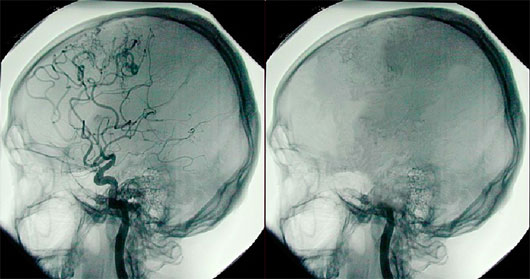Is the body still alive after brain death?
13-year-old Jahi McMath from Oakland, California (USA) was declared brain dead last month after suffering an extremely rare complication due to tonsil surgery. The Jahi family struggled to keep their daughters using a breathing machine, but a judge ordered the device to be switched off next week.
The fact is revitalizing the controversy over whether the brain dead could be considered dead and how much of their body will continue to operate with the help of technology and for how long?
A person is considered brain dead when he / she is no longer active in the brain or brain stem, ie no electrical impulses are transmitted between brain cells. According to Dr. Diana Greene-Chandos, professor of neurology and neurosurgery at Wexner Medical Center, Ohio University (USA), doctors will conduct a series of tests to determine who Is it brain dead?
One of these tests is to see if the subject can self-promote their breathing - a very basic reflex controlled by the brain stem."That is the last thing to be lost , " Greene-Chandos said.
In the United States and many other countries, a legal person is recognized as dead if he / she permanently loses all brain activity (brain death) or all respiratory and blood circulation functions. In Jahi's case, three doctors concluded that she was brain dead.

A person is considered brain dead when he / she is no longer active in the brain or brain stem, ie no electrical impulses are transmitted between brain cells.
However, the heart's internal electrical system can keep this organ from beating for a short time after a person dies. In fact, according to Professor Greene-Chandos, the heart can even beat outside the body. However, if there is no breathing aid to help circulate blood and oxygen, the heartbeat like this will stop very quickly, usually in less than an hour. With only a breathing machine, some biological processes, including kidney and stomach functions, can continue for about a week.
Kenneth Goodman, director of the University of Miami's Bioethics Program, stressed that maintaining such functions does not mean that the subject is alive."If you die brain, you're definitely dead. But with technology, we can make dead bodies do some things that are usually done when you're alive, " Goodman said.
Without the brain, the body will not produce important hormones, needed to maintain biological processes, including kidney function, stomach and immunity, for longer than 1 week. For example, thyroid hormone is essential for regulating body metabolism and pituitary hormones are needed for kidneys to filter water.
Normal blood pressure, which is also essential for physical activity, cannot usually be maintained if the brain dead person is not given blood pressure medication. A brain-dead person is also unable to maintain his or her body temperature, so his or her body must be kept warm with a blanket, high room temperature and sometimes warm IV fluids.
The body of a brain dead person is usually not supported for a long time. Doctors sometimes provide support (in the form of breathing machines, hormones, fluids, .) for days, if their organs will be used to donate or if the family needs more time. to say goodbye.
There are not many studies on how long a brain-dead body can be maintained. Debates about brain death began in the 1950s in France with six patients sustained life for about 2 to 26 days without blood flowing to the brain. This triggered the idea that, " maybe there is a second way to die, because these patients will eventually die . " Previously, a person was considered dead only when their heart stopped beating and they stopped breathing.
Today, with breathing aids, measures of hypertension and hormones, theoretically, the body of a brain dead person capable of sustaining activity for a long time, can be indefinite. Still, Greene-Chandos said, over time, a brain-dead person's body is becoming more and more difficult to maintain and tissues are at higher risk of infection.
- The brain is still active 10 minutes after the body dies
- What is brain death?
- Has the pig brain kept living outside the body?
- Coming up, people will master the death
- Life continues in the body 2 days after death
- Learn new definitions of death
- How does death feel?
- Found the 'smell of death'
- Brain death and human death
- Sudden death in young children is related to abnormalities in the brain
- Near-death experience through the insights of insiders
- Amazing things about the human brain
 Green tea cleans teeth better than mouthwash?
Green tea cleans teeth better than mouthwash? Death kiss: This is why you should not let anyone kiss your baby's lips
Death kiss: This is why you should not let anyone kiss your baby's lips What is salmonellosis?
What is salmonellosis? Caution should be exercised when using aloe vera through eating and drinking
Caution should be exercised when using aloe vera through eating and drinking Does exercising our minds a lot help us burn excess calories?
Does exercising our minds a lot help us burn excess calories?  How did Egyptian mummies remove the brain from the body?
How did Egyptian mummies remove the brain from the body?  Shocking evidence that near-death experiences are real in people who have had cardiac arrest
Shocking evidence that near-death experiences are real in people who have had cardiac arrest  AI has been able to accurately reproduce more than 80% of images in the human brain.
AI has been able to accurately reproduce more than 80% of images in the human brain.  Neuralink tests controlling a robotic arm with thoughts
Neuralink tests controlling a robotic arm with thoughts  Elon Musk's ambition to merge humans with AI
Elon Musk's ambition to merge humans with AI 